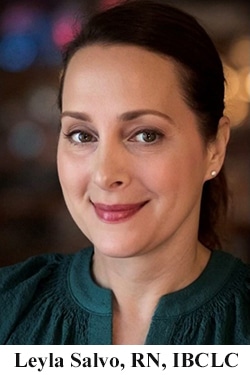Breastfeeding offers a wide range of health benefits for both moms and babies, from faster postpartum recovery to reduced cancer risks and stronger emotional bonds. But, for many new mothers, the journey can come with questions and challenges.
Leyla Salvo, RN, IBCLC, certified lactation consultant at Lovelace Regional Hospital, answers some of the most common questions and provides expert guidance on breastfeeding success.

Q: What are some of the benefits of breastfeeding for moms?
A: Breastfeeding supports postpartum recovery by helping the uterus contract and reducing bleeding. It also lowers the risk of breast and ovarian cancers and may decrease the likelihood of postpartum depression. Plus, it strengthens the emotional bond between mom and baby.
Q: What does a lactation consultant do before and after delivery?
A: Lactation consultants are available for prenatal consultations to help families understand breastfeeding basics and prepare for the early days after birth. We can even help moms order a breast pump before delivery. After birth, consultants work with moms in the hospital to establish a healthy breastfeeding routine. Support continues after discharge through phone consultations and outpatient visits.
Q: What should first-time moms expect when breastfeeding?
A: Breastfeeding is natural, but it’s also a learned skill. It can feel overwhelming at first, especially with frequent feedings and late nights. We encourage skin-to-skin contact, feeding on demand, and learning your baby’s hunger cues. Our team is here to guide and support you every step of the way.
Q: Is breastfeeding harder after a C-section?
A: It can be, but support makes a big difference. C-sections may require adjustments, especially with positioning due to abdominal discomfort. At Lovelace Regional Hospital, we prioritize skin-to-skin contact in the delivery suite and manage pain effectively. Our consultants help moms find comfortable positions to make breastfeeding easier.
Q: When should I stop breastfeeding, and how do I do it?
A: The American Academy of Pediatrics recommends exclusive breastfeeding for the first six months, with continued breastfeeding alongside solid foods for up to two years or longer. The decision to stop is personal. When you’re ready, we can help you transition smoothly and provide support during the weaning process.
Q: What if I’m not producing enough milk?
A: Most moms make enough milk, but if there’s a concern, we start by checking latch and milk removal. Milk supply is influenced by how often and how well a baby nurses. Stress, nutrition, and hormones can also play a role. A one-on-one consultation helps us identify and address the root cause.
Q: What should I do if breastfeeding hurts?
A: Pain is a sign that something needs adjusting. Don’t wait—reach out for help. We’ll work with you to find the cause and make breastfeeding more comfortable.
Q: Any tips for treating chapped nipples?
A: Keep nipples clean and dry. Rinse with warm water after feedings and let them air dry. If discomfort continues, schedule a consultation for personalized care and product recommendations.
Breastfeeding is a journey, and every mom’s experience is unique. With the right support and information, breastfeeding can be a rewarding and empowering part of motherhood.
For more information about the lactation services at Lovelace Regional Hospital in Roswell, call 575.625.3395. In Albuquerque, call 505.727.6797.

